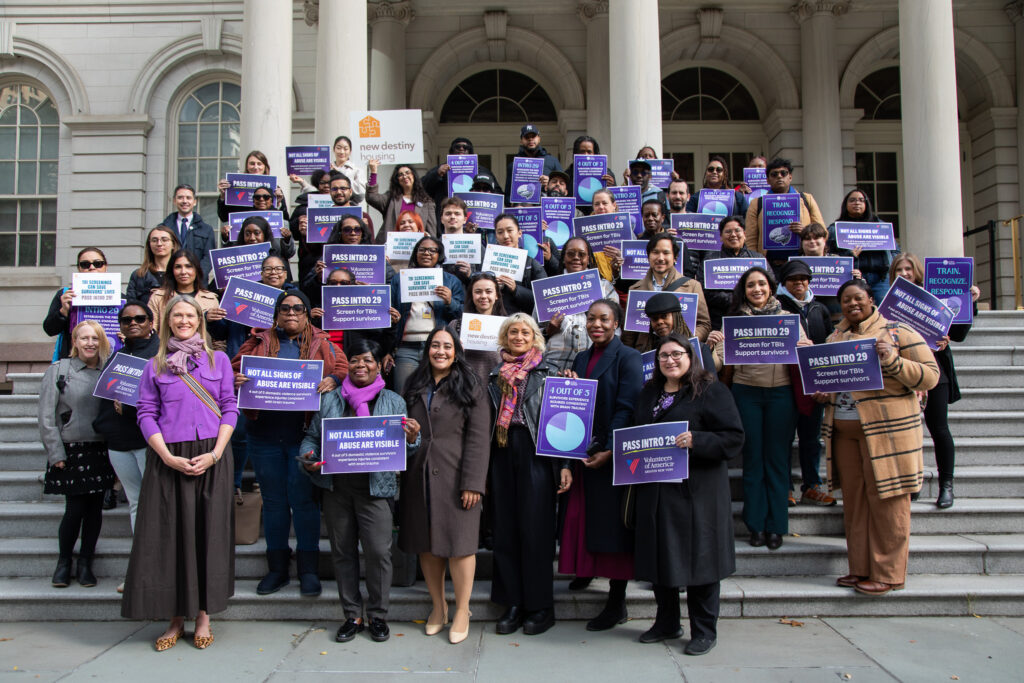
NEW YORK, NY – New York, NY — In a powerful show of unity and resolve, New York City Council Majority Leader Amanda Farías (District 18) today led a rally on the steps of City Hall alongside survivors, advocates, medical professionals, and community organizations in full anticipation of the committee vote and City Council passage of Intro 29 tomorrow, October 29. The legislation would bring much-needed attention and resources to the often overlooked intersection of traumatic brain injury (TBI) and domestic violence.
Intro 29 would require all NYPD and FDNY first responders to receive training on identifying and responding effectively to symptoms of TBI, ensuring that head trauma and its effects are not misinterpreted as resistance. The bill also tasks the Department of Health and Mental Hygiene (DOHMH) and the Mayor’s Office to End Domestic and Gender-Based Violence (ENDGBV) with leading a citywide awareness campaign so survivors, families, and communities understand how brain injury can be a consequence of domestic violence and where to get help.
Today’s rally brought representatives from Volunteers of America – Greater New York (VOA-GNY), Community for a Change, Arab American Family Support Center, New York LGBT Network, Brain Injury Association of New York State (BIANYS), Sanctuary for Families, New Destiny Housing, and the Domestic Violence Project at Urban Justice Center. Survivors and first responders also shared personal accounts that underscored the urgency of making brain injury recognition standard in our public health response.
VOA-GNY played a pivotal role in bringing this issue to light and directly informed the creation and introduction of this legislation. Through their groundbreaking pilot program with Safe Living Space, they were able to identify the alarming rate of brain injuries among survivors in domestic violence shelters—revealing that more than half of screened shelter residents reported head or neck injuries and symptoms consistent with TBI.
Their commitment to evidence-based advocacy helped to shape legislation that will now make these findings the foundation of citywide policy to train first responders and connect survivors to the care that they deserve.
“Tomorrow we set a new standard for how New York City cares for survivors,” Majority Leader Amanda Farías said. “Intro 29 builds a system that sees what is often invisible and underrecognized— brain injuries that impact livelihoods of people like you and me — and it ensures responders are equipped to act expeditiously. I am proud to lead on legislation that shifts the norm from ignorance to intervention.”
The Bronx and Brooklyn continue to experience the highest domestic violence rates in New York City, with the Bronx’s District 18 ranking second citywide in domestic and intimate-partner homicides. Annually, 230,000+ domestic violence–related incidents are reported to the NYPD — more than 600 calls per day. Without proper training, responders may misinterpret memory loss, confusion, or disorientation as hostility — often criminalizing rather than caring for survivors.
When passed, Intro 29 would make trauma-informed training mandatory across first responder units citywide and establish a public awareness campaign to bridge the gap between domestic violence and brain injury. With a bipartisan supermajority of co-sponsors and the momentum of today’s rally, New York City is poised to become a national leader in recognizing and responding to domestic-violence-related TBIs.
“Too many survivors of domestic violence live with invisible injuries that go undiagnosed and untreated,” said Council Member Gale A. Brewer. “Traumatic brain injury can have lasting impacts on memory, behavior, and emotional health—but too often, the signs are mistaken or dismissed altogether. Intro 29 is a critical step toward changing that. By ensuring that first responders are trained to recognize and respond to brain injuries, and by raising public awareness citywide, we can help survivors get the care and understanding they need. I’m proud to support this bill and the advocates who have fought tirelessly to make trauma-informed response the standard in New York City.”
Dr. Kathleen Monahan, Director of the Family Violence Education and Research Center at Stony Brook School of Social Welfare: “Kudos to the New York City Council for their foresight to support training for first responders and survivors regarding Traumatic Brain Injury. This vital information assists identification and recovery while improving the health of New Yorkers.”
Noelle Withers, Executive Vice President and Chief Program Officer at Volunteers of America-Greater New York: “At VOA-GNY’s domestic violence shelters, more than half of survivors enter with injuries likely to cause traumatic brain injury. Though widespread, these injuries are too often missed or misunderstood. We’re grateful for Majority Leader Farías’ partnership on this bill to raise awareness of this critical issue and ensure NYC’s first responders are better equipped to support survivors. Early detection of TBI can make all the difference in helping survivors access timely medical care, regain stability, and rebuild their lives through housing, health, and economic opportunity.”
Dr. Zusman, CEO and Executive Director of Safe Living Space: “Congratulations to New York City for taking the lead in training first responders to recognize brain injuries on domestic violence calls. Many survivors sustain trauma without ever hitting their head or losing consciousness, so these injuries often go unnoticed. Intro 29 bridges that gap by helping first responders apply the same TBI assessment skills they use in car accidents and falls to protect another high-risk group, survivors of domestic violence, ensuring everyone with brain injury receives timely medical evaluation and care.”
